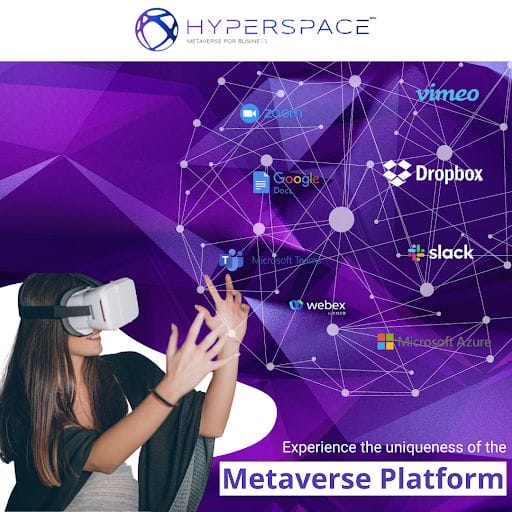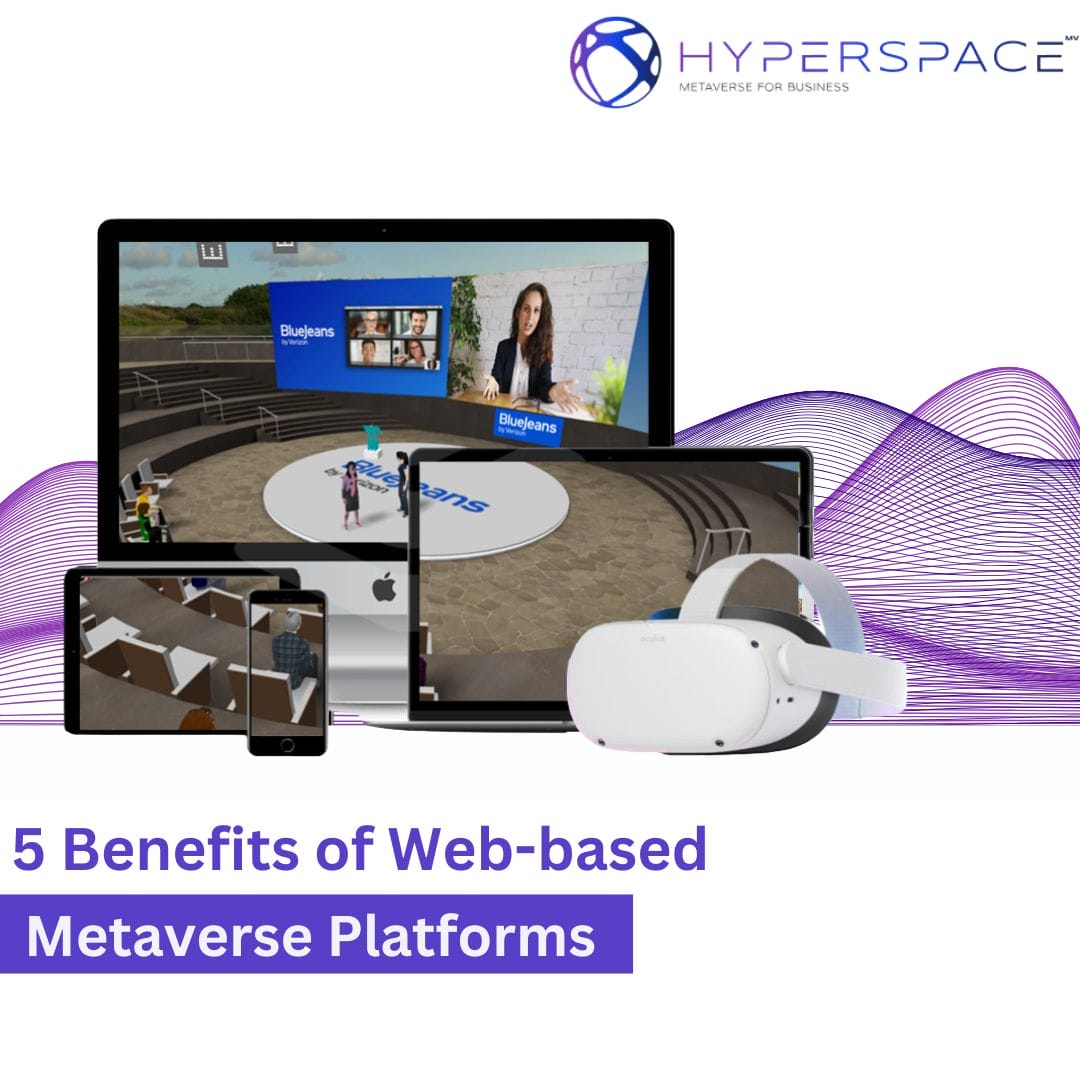sses increasingly move their operations into the metaverse data privacy and security become top priorities. Metaverse data privacy is essential for decision-makers looking to innovate in this space but doesn’t know where to start. In this blog post, we’ll explore how GDPR affects the Metaverse, best practices for securing your organization’s data in the virtual world, and how Hyperspace can help protect your valuable information when navigating through it.
Finally, discover why investing in secure solutions like Hyperspace could be essential as you take advantage of all the metaverse offers.
Table of Contents:
- Understanding GDPR and Its Impact on the Metaverse
- Best Practices for Securing Data in the Metaverse
- Benefits of Using Hyperspace to Secure Your Data in the Metaverse
- FAQs about Metaverse Data Privacy
- Conclusion
Understanding GDPR and Its Impact on the Metaverse
The General Data Protection Regulation (GDPR) is a set of rules designed to protect the data privacy and security of personal data, including metaverse data privacy. It applies to any company or organization that collects, stores, processes, or uses the personal data of individuals located in the European Union (EU). As a result, GDPR has significantly impacted how businesses handle data privacy in the Metaverse.
What is GDPR?
The EU introduced GDPR in 2018 to give people more control over their personal information to regulate data privacy and security. It requires companies to be transparent about how they use and store customer data, provide customers with access to their information upon request, and take steps to ensure that customer data remains secure. Companies must also obtain explicit customer consent before collecting sensitive information, such as financial details or health records, to comply with data privacy considerations. Violations can result in hefty fines for non-compliance.
How does GDPR affect data privacy in the Metaverse?
The introduction of GDPR has made it much harder for companies operating within virtual worlds to collect user data without users’ permission. However, businesses must comply with all applicable regulations when setting up their virtual world presence if they want access to valuable user insights such as demographic information or purchase history. Additionally, companies should be aware that even if a user consents initially, this consent may not extend beyond specific time frames. Hence, regular review of policies is essential for compliance and data privacy considerations. By following best practices such as implementing secure authentication protocols, utilizing encryption technologies, and establishing access control policies, organizations can be sure that their data privacy is implemented securely.
Businesses need to understand the implications of GDPR on their data privacy in the Metaverse. Organizations can ensure that their data remains secure in this virtual world by following best practices such as implementing secure authentication protocols, utilizing encryption technologies, and establishing access to update data privacy policies. Integrate seamlessly with enterprise SSO authentication, bank-level data privacy, and security while satisfying governmental standards like GDPR. Ensuring data privacy, Hyperspace offers seamless integration with enterprise SSO authentication, bank-level data privacy, and security for maximum security while adhering to governmental requirements such as GDPR. Ensuring secure authentication protocols are implemented, encryption technologies are utilized, and access to update data privacy policies is established.
Best Practices for Securing Data in the Metaverse
As businesses move into the Metaverse, it is essential to understand best practices for securing data. Implementing secure authentication protocols, utilizing encryption technologies, and establishing access control policies are all essential to ensuring that data remains safe within a virtual environment and data privacy is monitored.
Secure Authentication Protocols:
Businesses should implement secure authentication protocols such as two-factor or biometric verification to protect data from unauthorized access. This helps ensure that only authorized users can access sensitive information stored in the Metaverse. Additionally, organizations should consider using strong passwords and regularly changing them to enhance security measures further.
Encryption Technologies:
Encryption technologies help protect data by encoding it so it cannot be read without an appropriate key or password. Businesses should use encryption when transferring and storing confidential information in the Metaverse to keep their data safe from malicious actors who may try to steal or manipulate it.
Access Control Policies:
Establishing clear access control policies is critical for data privacy in the Metaverse. These policies should specify which users can view certain types of information and what actions they can take with this information (e.g., downloading files). Access control policies can also include restrictions on how long certain pieces of information can be accessed before being deleted or archived securely offsite for future reference if needed.
By utilizing secure authentication protocols, encryption technologies, and access control policies, businesses can ensure that their data is kept safe in the Metaverse. With Hyperspace’s intuitive drag-and-drop interface, customizable templates and features, and comprehensive security solutions, businesses have the tools to protect their data in the Metaverse easily. Hyperspace ensures seamless integration with enterprise SSO authentication, bank-level data privacy, and security while satisfying governmental standards like GDPR.
Key Takeaway: Businesses should protect data in the Metaverse by implementing secure authentication protocols and encryption technologies and establishing access control policies.
Benefits of Using Hyperspace to Secure Your Data in the Metaverse
The use of Hyperspace to secure data in the Metaverse is becoming increasingly popular. With its intuitive drag-and-drop interface, customizable templates and features, and comprehensive security solutions, businesses can easily create and customize their virtual worlds while keeping their data safe from malicious actors.
Intuitive Drag-and-Drop Interface:
Hyperspace’s user-friendly drag-and-drop interface makes it easy for users to quickly create immersive experiences without writing code. This allows businesses to rapidly prototype ideas or make changes on the fly without having to wait for a developer or designer.
Customizable Templates and Features:
Hyperspace offers a wide range of customizable templates allowing users to design unique virtual environments tailored to their needs quickly. Additionally, they offer advanced features such as asset libraries, 3D object manipulation tools, and audio/video integration capabilities, enabling businesses to bring their vision into reality faster than ever.
To ensure that your data remains secure in the Metaverse, Hyperspace provides an array of security measures, including authentication protocols (e.g., two-factor authentication), encryption technologies (e.g., AES 256-bit encryption), access control policies (e.g., role-based access control) and more. These measures help protect against unauthorized access by ensuring that only authorized personnel can access sensitive information within the platform. Additionally, it Integrates seamlessly with enterprise SSO authentication, bank-level data privacy, and security while satisfying governmental standards like GDPR ensuring data privacy.
By leveraging the powerful tools Hyperspace provides, businesses can confidently create engaging virtual experiences while protecting their data from potential threats. These tools include authentication protocols such as two-factor authentication, encryption technologies like AES 256-bit encryption, and access control policies like role-based access control. With these measures in place, businesses can ensure that only authorized personnel can access sensitive information within the platform.
The benefits of using Hyperspace to secure your data in the Metaverse are clear: an intuitive drag-and-drop interface, customizable templates and features, and comprehensive security solutions. Let’s now look at how these features can summarize key data privacy points in the Metaverse.
Secure your data in the Metaverse with Hyperspace. Leverage powerful tools like two-factor authentication, AES 256-bit encryption & role-based access control to keep your virtual world safe. #MetaverseDataPrivacy #NoCodePlatformClick to Tweet
Data privacy is a significant concern for businesses operating in the Metaverse. The European Union’s General Data Protection Regulation (GDPR) has established strict guidelines on how companies must protect user data, and non-compliance can result in hefty fines.
To ensure that their data remains secure, businesses should implement secure authentication protocols, utilize encryption technologies, and establish access control policies.
Hyperspace offers an intuitive drag-and-drop interface to help businesses create and customize their virtual worlds quickly and easily. It also provides customizable templates with comprehensive security solutions to protect customer data from unauthorized access or misuse. By using Hyperspace as your solution for securing your data in the Metaverse, you can rest assured that your business will remain compliant with GDPR while still enjoying all of the benefits this rapidly growing industry has to offer.
Protect your data in the Metaverse with Hyperspace. Our intuitive drag-and-drop interface and customizable templates make creating and customizing virtual worlds easy while keeping customer data secure. #MetaverseDataPrivacy #GDPRCompliantClick to Tweet
FAQs about Metaverse Data Privacy

What are the data privacy issues in the metaverse?
Data privacy is a significant concern in the Metaverse, as users may share personal data with companies and other entities. Therefore, companies must ensure that they have adequate security measures in place to protect user data from unauthorized access or use.
Additionally, companies should provide clear and concise privacy policies that explain how their customers’ data will be used and stored. Finally, businesses should ensure that any third-party vendors they work with comply with applicable laws and regulations regarding user privacy.
What is a metaverse privacy policy?
Metaverse privacy policies are designed to protect users’ data and their activities within a virtual world. They outline how user data is collected, stored, used, shared, and protected by the platform provider. This includes what type of information is collected (e.g., IP address, location), how it’s used (e.g., for analytics or marketing purposes), and who has access to it (e.g., third-party vendors). Additionally, metaverse privacy policies should include provisions regarding user rights, such as opting out of certain services or deleting their account altogether if they choose to do so. By providing transparency into how user data is handled in a virtual environment, metaverse privacy policies help ensure that users feel safe while exploring these digital worlds.
How do you increase privacy in the Metaverse?
To increase privacy in the Metaverse, businesses should use encryption and authentication technologies. Encryption can protect data from unauthorized access, while authentication ensures that only authorized users can access a given virtual world. Additionally, businesses should consider implementing user-level permissions to control who has access to certain areas or features within their virtual world. Finally, businesses should ensure that all user communication is encrypted and secure by using end-to-end encryption protocols such as TLS/SSL or VPNs. By taking these steps, businesses can create a safe and secure environment for their customers in the Metaverse.
Why is Metaverse a privacy nightmare?
The Metaverse is a privacy nightmare because it provides an environment where personal data can be collected, shared, and exploited without the user’s knowledge or consent. For example, data can be gathered from users through virtual interactions such as conversations, purchases, or activities in-game. This data can then be used to target ads and other content to the user without their permission. Additionally, there are no laws governing how this data is stored or who has access to it, making it vulnerable to malicious actors looking for ways to exploit unsuspecting users.
Conclusion
In conclusion, data privacy is important for businesses looking to enter the Metaverse. It’s essential to understand GDPR and other relevant regulations to ensure that your data is secure and compliant with the law. Additionally, implementing best practices such as encryption, limiting access rights, and regularly auditing security measures can help protect your data from malicious actors.
Hyperspace provides a powerful platform for businesses to create virtual worlds while ensuring their data remains safe and secure through its intuitive drag-and-drop interface, customizable templates, and advanced security features.
Additionally, Hyperspace provides a rich collaboration environment where people inside and outside your organization can work together, coauthoring spaces. It provides various options to help you create a secure and productive collaboration environment that meets your organization’s needs.
By taking advantage of these tools, businesses can confidently explore the opportunities presented by the Metaverse without worrying about compromising their users’ personal information or violating any laws regarding metaverse data privacy.
We must ensure that the data we collect and store in our Metaverse is secure, private, and accessible only to those with permission. Hyperspace provides businesses with an easy-to-use platform for creating virtual worlds but also needs to prioritize user privacy. We must develop solutions that protect users’ personal information from misuse or theft while allowing them to access their data when they want it. So let’s join forces today and create a safe online environment where individuals can trust their digital footprint remains secure!





